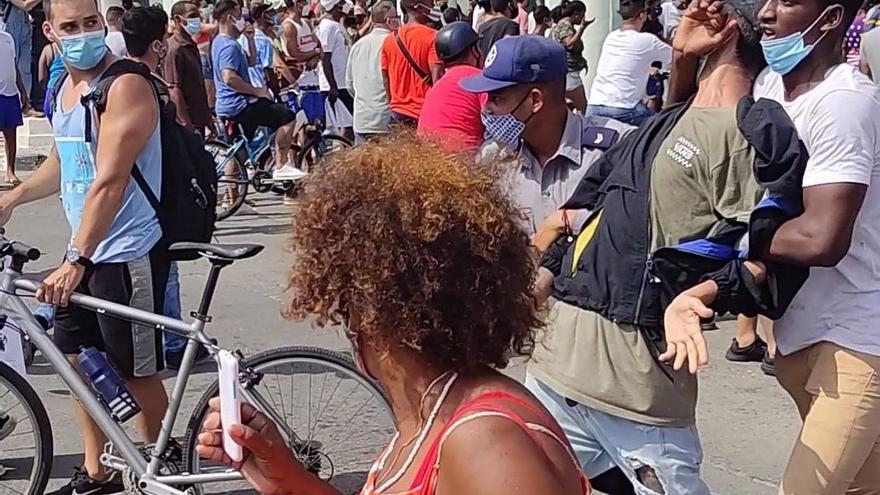
![]() 14ymedio, Havana, July 19, 2021 — Eight days after the start of protests, there is still no official count of those arrested during the demonstrations that took place in more than forty Cuban cities. Several human rights organizations suggest it could be in the thousands while the United Nations puts the number at 187.
14ymedio, Havana, July 19, 2021 — Eight days after the start of protests, there is still no official count of those arrested during the demonstrations that took place in more than forty Cuban cities. Several human rights organizations suggest it could be in the thousands while the United Nations puts the number at 187.
Among them are well-known activists such as Jose Daniel Ferrer and the artist Luis Manuel Otero Alcántara. Most of the detainees, however, are anonymous Cubans who took to the streets to express their desire for freedom and their exasperation with a 62-year-old regime that has destroyed the country.
What they all have in common, according to a legal article published by Cuban Prisoners Defenders, is that they are all being subjected to a type of summary trial procedure known as “sworn statement.”
“It is so called because it goes straight from police investigation, without prosecution or due process, to the oral hearing,” explains the Madrid-based organization. “It is the police, the police investigator — there is no investigating judge in Cuba, a position that was abolished by Fidel Castro — and not the public prosecutor, which is in charge of the process from beginning to end.”
It is “a police trial, not a legal trial,” states the CPD, in which the police “initiate, administer and control the entire process, including setting the trial date.”
According to the CPD, once police officers indicate to the judge that the procedure will be a “sworn statement” trial, they themselves, with the judge, conduct the oral hearing “without prosecutor, attorney or the accused being present and without [these parties] knowing the purpose of the proceeding.”
At no point in the process does the accused have access to the trial brief, including the formal charges. The brief is not prepared by a prosecutor but by a police officer. “The prosecutor can choose not to participate, in which case the trial will proceed without him,” the article explains. “If the defendant has an attorney, he may only see the file for a few minutes before the hearing.”
“From the beginning of the trial to sentencing takes no more than five days,” says the CPD article. “From one to four days to charge and investigate, then twenty-four hours to prepare a court case, make an oral argument and issue a sentence. In this case, however, it could take as long as forty-eight to ninety-six hours.”
According to authorities, the objective is to apply a “flexible and expeditious method and means to legal matters that are handled within the summary procedures of the municipal courts.” However, the CPD argues this process “flagrantly violates the guarantee of due process established in articles 94 and 95 of the Constitution” as well as international law and the right to an effective defense.
The organization also claims it violates the right of the accused to appoint a defense attorney and to provide evidence through communication with that attorney. “There is no guarantee the accused will be allowed to present this [evidence]” or that the principle of disclosure, on which all due process rests, will be followed. The CPD notes that the “sworn statement” process suggests “a hasty trial behind closed doors without communication between the parties involved,” analogous to the accusatio process of ancient Rome.
In a statement issued on Saturday, the Cuban Human Rights Observatory (OCDH) expressed disappointment that Josep Borrell, EU High Representative for Foreign Affairs, and Michelle Bachelet, UN High Commissioner for Human Rights ,” are trying to divert attention from the reasons for the massive protests in recent days in Cuba.”
“The demonstrations called for many things but the most commonly heard refrains were ’freedom and ’we are not afraid.’ To cite economic hardship as the sole reason for the protests, as Ms. Bachelet has done, is to completely misunderstand what is happening in Cuba,” writes Executive Director Alejandro Gonzalez Raga in the OCDH statement.
Gonzalez Raga also believes Borell mistakenly blames the United States: “These protests are the result of sixty-two years of repression. It is Cuba that has to change. We have to focus exclusively on those responsible for Cuba being a dictatorship today.”
Jose Daniel Ferrer Cantillo, son of the Patriotic Union of Cuba’s director, was arrested along with his father on Sunday, July 11, before they could join a demonstration that was taking place in Santiago de Cuba. In a video he describes how he was accused of incitement of public disorder, “propagation of epidemics” and disorderly conduct. The charges were reduced, he was informed, “to public disorder, nothing more.” He was issued a written warning, told not to participate in any marches and to report every Tuesday to the Versailles police station.
When he refused, they threatened to throw him in jail, like they had done to his father. He reported that they also beat everyone who came into the police station where he was being held. “Young people, old people, anyone they managed to arrest that day.” Among the prisoners was a pregnant woman who, he says, did not get the care she needed.
He also reports his father was having a heath crisis involving an ulcer when he left his house and is ill. “They are the worst conditions in the world. It’s like a concentration camp.”
____________
COLLABORATE WITH OUR WORK: The 14ymedio team is committed to practicing serious journalism that reflects Cuba’s reality in all its depth. Thank you for joining us on this long journey. We invite you to continue supporting us by becoming a member of 14ymedio now. Together we can continue transforming journalism in Cuba.
